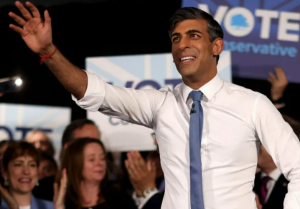I have never before heard of pegging an election launch to a set of economic statistics, but Prime Minister Rishi Sunak has clearly decided to go for an election on the back of Wednesday’s inflation figures, and the stronger than expected exit from recession.
Inflation figures showed that the UK rate is at its lowest level in almost three years. That figure was not unexpected. Headline inflation in general is now back to more normal levels, though not quite yet at the Bank of England’s target.
Those numbers did have a sting in the tail, however. Underlying measures of inflation, especially in the service sector, remained stubbornly high at just below 6%. This means that a Bank of England rate cut on 20 June – in the middle of the campaign – is considered rather less likely now.
But the PM clearly thought he had enough of an economic turnaround story to tell the nation, and that the triple price shock is beginning to ebb away.
It’s a significant gamble on election economics. Firstly that there is a recovery – and Wednesday’s figures help. It’s a further bet that any recovery will be widely felt, and lastly that the public feel that credit is due to the Conservative government.
His pitch will be that as chancellor and PM, he shepherded the country through three years of global crisis, with unprecedented economic support for jobs and bills, and the public should not “risk the recovery”. His party wants to paint a vision of a Korean-style high tech economy, with more efficient, digitised public services allowing a smaller state and lower taxes.
But Labour also wants to fight on the economy. Keir Starmer and Shadow Chancellor Rachel Reeves will say some of the blame for high prices and mortgage rates lies with the government of the day and that, in any case, families do not feel a turnaround.
They will incessantly focus on the fallout in the aftermath of Liz Truss’s mini budget, and say “economic stability” is a change from three PMs and four chancellors in one parliament. They will argue for more green investment and house building and public money for steel communities.
Ultimately the Conservatives want credit for running the economy during a tumultuous triple shock, and returning to growth and normal inflation. Labour want to blame the incumbent for what happened on their watch.
An argument about economics is likely to define this campaign.
But it may be more about the economic past than the future.
BBC

